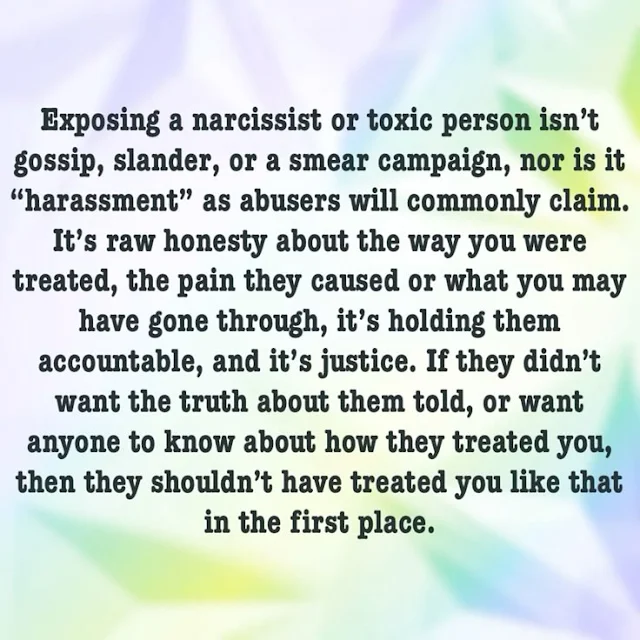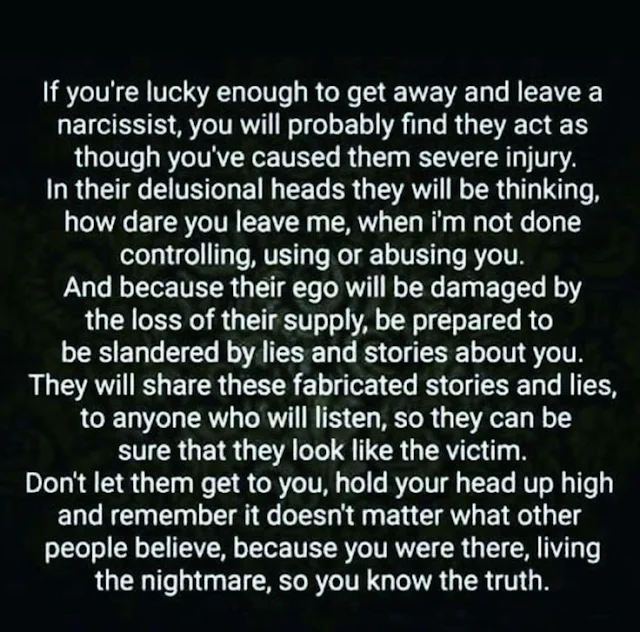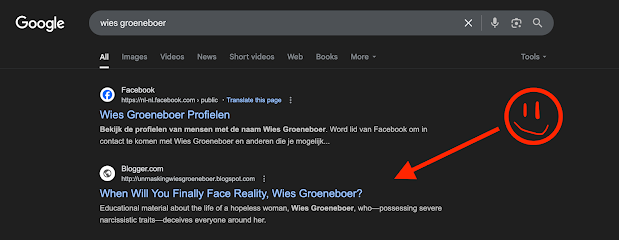What leads me to publicly name and shame my harmful narcissist mother who almost killed me as a result of a life-long pervasive pattern of narcissistic abuse and neglect, you ask?
I am aware there are some possible future expected scenarios:
Even if your latest smear campaign prompted my public exposure of your nature being narcissistic, your continued or escalated efforts can theortically still affect me in several specific ways, not because your narrative is more credible, you can forget about that avenue of attack, but because of how social, psychological, and institutional systems might respond when you start running your little exploits. In practice however such exploits will prove futile.
1. Possible Reputational Noise and Fatigue
- Dilution of your message: Even if your evidence is superior, a smear campaign can flood the informational space with confusion, misinformation, or emotionally charged counter-narratives that make it harder for outsiders to discern the truth.
My position: Outsiders are irrelevant. I fully expect my mother to present more and more detailed representations of things I have said and done in times I was in mental agony or otherwise incapacitated by trauma and mental illness to as many people as possible. I also fully take responsibility for any past incidents in which I have caused harm or inconvenience to people, but I also expect any information that should appear to be exaggerated, distorted, fragmented, or otherwise made to shine false light on what actually took place and the reasons behind the tragedies of my life. So be it, I am a severely damaged individual who is working extremely hard to heal and continue to seek out the tools I need to recover from a lifetime of manipulation and abuse, so I do not feel ashamed of any misrepresentation of my character that finds it’s origin in my mothers deceptive fantasies of lies and spin doctoring.
- Audience doubt: Some observers may default to neutrality (“both sides are probably wrong”) or avoid taking a stance entirely to protect themselves from involvement.
My position: this is excessively easy to reason about: the only thing to say is let every person make up their own mind based on their own interpretations. That’s all one may expect of anyone. I need not concern myself with this matter.
- Social fatigue: Mutual acquaintances or communities may grow tired of the conflict, regardless of who’s right, and emotionally distance themselves from you to avoid stress.
My position: I do not tire my social circle with endless talk about you. You are not worth the loss of precious breath. I work alone and I know what I am doing, that is enough. There is no fatigue on my side of the conflict, and any fatigue on your end is my pleasure. Neutral individuals will be protected by me by leaving them out of the conflict as much as I can. Their fatigue if any is most likely your toxicity at work. There is nothing you can harm me with regarding social fatigue. I behave in a well balanced way interpersonally and to those who deserve it in a respectful manner regarding their boundaries, wishes, level of self-involvement and reasonable expectations as to their cognitive and emotional capacity.
2. Slander Leading To Possible Institutional or Professional Consequences
- Weaponization of systems: Narcissists often misuse formal structures—like work complaints, police reports, or legal threats—to harass or discredit. Even false or frivolous accusations can cause time loss, stress, and reputational ambiguity in professional or bureaucratic settings.
My position: go ahead. I have extensive proof of a lifetime of mistreatment, and not only of my own. I know who to involve to back up my story and the by-effect will be the exposition of your multiple criminally callous social assassination attempts on people from your past. Legal judges will first attempt to judge your character and intentions. I don’t think any reasonable judge will be impressed by your fabrications, instead they will blow holes through your narratives and relegate your complaints to the garbage can. They may ask me to remove my public exposé, but by then it will have had its intended effect.
- Credibility damage through insinuation: They may not refute facts directly, but instead subtly frame you as “obsessed,” “unwell,” or “vindictive.” These character insinuations can undermine your image without ever addressing the truth.
My position: you can try, but you’ll only find yourself failing to have any sort of impact. This is the first and the last time you’ll see my vindictive side and it’s because you’ve done enough to truly deserve a real set of reputational challenges like you’ve never had to deal with before. So go ahead, knock yourself out trying to insinuate whatever you like. It’s your own energy and peace of mind you’re wasting and your own image you’re damaging further because every attack by you will be documented from now on and contextualized properly and in timely fashion.
3. Renewed Psychological Abuse Escalation Through Attempted Informational Threats
- Gaslighting in public: Continued campaigns may re-trigger trauma, self-doubt, or emotional exhaustion. Seeing lies spread and believed—even temporarily—can create intense cognitive dissonance and grief.
My position: Ooh scary.. well not really. It’s too late for this, it will not affect me in any way, everybody knows what I'm like because i'm consistent and it's not going to be suddely any different in the face of slander. Doesn't even phaze me.
- Isolation tactics: They may manipulate mutual contacts to abandon or doubt you, creating emotional isolation even when you were right to expose them.
My position: I cannot be isolated from my social support system because it’s the system that allowed me to begin realizing the truth in the first place. They know me better than my narcissistic mother does because they were there when my mother shined in absence during crises in my life. These are the people who have allowed me to rehabilitate my personality, realize what my relational limitations are at least currently and to learn what healthy friendships should be like and feel like by showing me real love and true acceptance for decades. They’ve been by my side during my lowest and most enjoyable moments. They’ve protected me from a harmful ex partner in the past, so they know what is what when it comes to insinuations and attacks. They are also aware of developments regarding my mother, but only just enough to know what’s going on. The details are really only meant for my mother’s social circle to examine. My friends really don’t really care or need to know much more or every detail, they’ve realized aspects of my maternal relationship before I even did and we have better things to discuss.
Chance of slander having an effect is now negligable:
Smear campaigns work not by winning on truth but by manipulating perception, systems, and emotions. But that is no problem because my defense is guaranteed by:
- Clear, concise and well-supported documentation where needed;
- A consistent tone and taking the liberty to write the way I feel;
- A consistent story with no imaginary tales or mere hear-say;
- Strong boundary enforcement that nobody will be able to break;
- Support networks activated since commencement of this project that understand narcissistic abuse;
- Commitment to factual, truthful and undistorted representation of my own trauma and how it was caused;
- Eventual documentation of milestones in my emotional, psychological and physical growth and healing processes.
People will recognise that this blog was written by someone telling the truth and that's simply because it will also be found by people who are also victims and who will use it for their own healing. And strategically, by preemptively naming the tactics you might use some day and framing my exposures in those terms will make your smear campaign look like exactly what it is: a desperate projection that was predicted in advance. Exposing the patterns before they play out by naming the tactics before they strike, I will rob you of the element of surprise and make your attacks look exactly as they are: desperate and non-credible. People will recognise the fruit by the tree.





